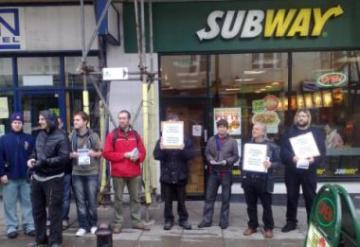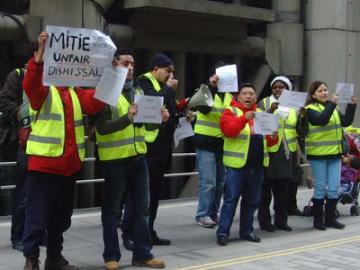In this issue
National Day of Action against Subway: A series Subway outlets in the UK and Ireland are picketed following the victimisation of a pregnant Subway worker in Belfast.
Know your rights: Maternity Leave The regular Catalyst column at our rights when we're pregnant.
Strike in the city: Latin American cleaners demonstrate against the sacking of five of their colleagues by the Mitie cleaning contractor.
Post office for sale! The Labour government's plan to privatise Royal Mail backfires.
The Great Labour Party Swindle More about the great social democratic love story.
Occupy and win!
Workers at car parts manufacturer Visteon in Belfast, Enfield and Basildon occupied their factories on Wednesday 1st April, after they were given six minutes’ notice of closure and told to leave immediately. 565 jobs have been lost at Visteon plants across the UK. Left with no alternative, the workers staged a spontaneous sit-in, first in Belfast then spreading to the other two plants.
Many of the workers had worked at the Enfield factory, originally owned by Ford who set up Visteon and transferred the factory operations to it in 2000, for many years. Ford had agreed that the workers transferred to Visteon would receive the same conditions as other Ford workers, but the bankruptcy of Visteon UK left them with the legal minimum redundancy payments and pension compensation. Workers demanded that the Ford redundancy and pension terms they had been promised be honoured.
The factory occupation was a headache for their union Unite, the largest social-democratic union in the UK. The administrators of Visteon UK, KPMG, got a court order to evict the occupiers and took legal action against Unite. Union leaders sought to protect themselves and the union’s corporate interests, and “advised” the workers to leave the factory or face arrest, jail, fines and a criminal record.
The union agreed with KPMG that workers would leave the factory in Enfield at midday on Thursday 9th April and its general secretary flew to New York to meet with the parent company to “negotiate” the end of this dispute by that date. Workers complied with union advice and vacated the factory in return for talks with the company at a secret location on Tuesday 14th, but maintained a 24-hour picket to prevent removal of equipment in the interim.
Local trades unionists, anarchists and community activists from Enfield, Haringey and the rest of London supported the occupation. They argued against vacating the factory as its possession was the workers’ best bargaining tool, but union officials held sway over the workforce. The occupation did win “talks”, but continuing it might have won the workers’ demands in full. However, these initial negotiations produced an offer rejected as “insulting” by the workers. In the present crisis this situation will recur, it is vital that the lessons are learned and that in future workers organise to resist pressure from union officials to accept “fair” settlements.
Ford UK plans to transfer some of its production to Bulgaria and Turkey and has announced redundancies. Shutting down Visteon UK is part of Ford’s longer term plan to outsource manufacturing to those parts of the world with “employer-friendly” labour laws and conditions. Directors of Visteon UK are also rumoured to be setting up a replacement company to continue to supply Ford with car parts, having wiped its debts and dispensed with its existing workforce through bankruptcy. On April 28th, management at Linamar, a former Visteon plant in Swansea, announced they were sacking the Rob Williams, the Unite convenor there. He has been active in supporting the Visteon workers and in fighting against redundancies in the Swansea factory. There was an immediate walkout by the workers there and, when management called police to forcibly remove him, the workers surrounded his office and stopped them. This action has forced the management to negotiate, though the threat of sacking is still there.
Workers from the Belfast Visteon plant where the occupation is still ongoing have been touring the country and visiting other sites of struggle, including the Lewisham Bridge school occupation, and the Linamar site in Swansea.
National Day of Action against Subway
On April 4th, several Locals of the Solidarity Federation, alongside other anarchists, trade unionists and activists took part in the national day of action against Subway, in support of victimised pregnant worker Natalia Szymanska. This day saw pickets of Subway stores across Britain and Ireland, demanding her reinstatement and compensation.
19 year old Natalia Szymanska worked at a Belfast branch of Subway. As she was 5 months pregnant and working until 10pm, she arranged for her boyfriend - an employee of the very same company - to pick her up and walk her home. He had done this many times previously, with the full knowledge and agreement of her managers and never before had it been a problem. However, unknown to Natalia her managers had a different plan on this occasion, because a month previously she had informed them she was pregnant - a fact which would require them to provide her paid maternity leave.
Management seized upon the presence of her boyfriend, and Natalia was dismissed in a farce of a disciplinary. Her managers believed she would have no recourse, and be forced to accept their decision. Their excuse was violation of health and safety - allowing an “unauthorised member of staff” onto the premises. Quite why the presence of another employee of the same company represented such a dire threat to health and safety was never explained.
Natalia turned to the Belfast and District Trade Union Council, who for the past several months have been holding a regular series of pickets of the premises in question, supported by a wide array of organisations from the labour movement and beyond. Thus far, G.G. Cuisine, the franchise holder has been unwilling to budge, and so the decision was made to turn up the pressure, and spread the pickets across the whole of Britain and Ireland. The aim is to force Subway to pressure G.G. Cuisine into settling with Natalia and to show that we will not allow bosses to treat any worker with such contempt.
The pickets were well attended across both countries, being hold in a wide range of cities, including London, Brighton, Belfast, Bradford, Manchester, Bristol, Liverpool and Dublin. In Brighton and London pickets were also held at a wide range of different Subway store Since the pickets, the franchise holder has attempted to get an injunction against Belfast TUC in order to stifle the protest, but as we go to press, the struggle for Justice for Natalia continues.
Know your rights: Maternity Leave
A woman can take 26 weeks of ordinary maternity leave and and additional 26 weeks of additional maternity leave. The first 2 weeks maternity leave is compulsory, 4 weeks if the woman works in a factory.
At least 15 weeks before the child is expected (the qualifying week), a pregnant worker must tell her employer that she is pregnant, when the baby is due and when she intends to start her maternity leave. This can be changed, for example if the baby comes early. The employer must reply in writing setting out her expected date of return. If they don’t, she cannot be prevented from returning early and is protected from losing out if she returns later.
All pregnant workers are entitled to paid time off to attend ante-natal care. A woman is entitled to statutory maternity pay (SMP) if she has:
- worked for the employer for at least 26 weeks before the qualifying week
- had average earnings of at least £90 per week in the 2 months prior to the qualifying week
- given medical evidence of pregnancy and notified the employer correctly and stopped work.
SMP amounts to 6 weeks pay at 90% of average earnings – called higher rate SMP; a further 33 weeks at a flat rate of £123.06 or 90% of average earnings, whichever is lower. You will receive it for 39 weeks in total unless you go back to work earlier. You get it even if you do not intend to go go back to work. It is paid by your employer and is subject to tax and NI. If you do not qualify for SMP you can get maternity allowance (MA). If you’ve worked for more than one employer you may get standard rate MA, which is the same as standard SMP. If you earn between £30 and £90 a week you are entitled to MA of 90% of average earnings If your employer has a contractual maternity pay scheme it will be better, though there may be an issue of paying some of the pay back if you choose not to return to work.
You are allowed contact with work during maternity leave. You are also allowed to do up to 10 days work under the Keeping in Touch scheme, for which you must be paid.
If you don’t want to return to work, you must give at least your contractual notice. An employee who returns after Ordinary Maternity Leave is entitled to return to the same job and conditions, unless there has been a redundancy situation. Anyone made redundant during maternity leave may have a claim for unfair dismissal or sex discrimination. If you have children under six you have the right to request flexible working.
For more general information on your rights at work: www.stuffyourboss.com
Strike in the city
Latin American cleaners on Friday 3rd April held the latest in a series of weekly demonstrations outside their former workplace in the insurance firm Willis in the City of London against the sacking of five of their colleagues by the Mitie cleaning contractor. The four men and one woman were dismissed following an email conversation with management, in which the cleaners registered their unhappiness at a sudden change in shift patterns, done without consultation.
The Mitie Five were clearly considered to be the ‘ringleaders’, yet this campaign has been organised by all the cleaners, using the resources of their Unite union when necessary but acting on their own initiative when the union has not given them what they want. A recent deal between Unite and Mitie was rejected by the cleaners, who consequently found themselves abandoned by the union. Their firing is also clearly linked to the recent Justice for Cleaners campaign, in which Mitie and Willis were forced to increase the cleaners’ wages from a minimum wage of £5.73/hour to £7.20/hour.
Following the cleaners’ victory, management changed their shift times from 7-11pm to 10pm-6am in a deliberate provocation. As one cleaner commented, “I have four children in school. How can I be expected to suddenly start working all night and not be there for my children in the morning?” Many other Mitie employees work second jobs, which have now been thrown in jeopardy by the shift changes.
The demonstrations have yielded responses from both Willis – who insincerely claim that the cleaners’ pay does not concern them – and Mitie, who recently called the cleaners into “negotiate”, only to issue them with a lawyer’s letter accusing them of libel! Regardless, the struggle continues, with the cleaners determined to win their jobs back.
Despite working on the same streets as the nation’s new Public Enemy Number One (the greedy bankers of the City of London), migrant cleaners represent some of the most poorest and most vulnerable workers in the UK, and have found themselves on the frontline of the recession’s assault on living and working conditions. The Square Mile has been the target of various attacks in recent weeks, but while a smashed bank window may make for a good photograph, it is struggles such as these which have the potential to reverse the consequences of the economy’s implosion via workers’ self-organisation.
Post office for sale!
Here we are with the world teetering on the edge of economic depression and having to spend trillions sorting out the mess caused by banks and what does the Labour government come up with - the part privatisation of the Royal Mail! It just demonstrates how market thinking has captured the very soul of the Labour Party, even at a time when the free market is causing havoc they still cannot see any alternative to privatisation. One wonders just what it will take for Labour to kick their free market addiction.
But this might be just one privatisation too far, people are increasingly repulsed by the greed and inequality created by market forces and they are in no mood to support the privatisation of the Royal Mail. Even politicians are waking up to this fact. A recent report from a select committee chaired by Tory MP Peter Luff positively savages Labour plans for the Royal Mail.. The report challenges Labour’s plans to separate the Post Office from Royal Mail Group. It queries why the much needed cash injection has to come from a sell-off and argues that neither the Hooper report into the Royal Mail nor the government has made a real case for privatisation.
When select committees start to oppose privatisation it is a sure sign that Labour is in trouble. But the danger is that union leaders will launch one of their pathetic, costly campaigns, aimed at winning over the general public and Labour MPs. You can almost hear them explaining just how many MPs are opposing privatisation. But Labour MPs bitterly oppose things right up to the eve of the vote in Parliament, when suddenly they change their minds and accept the first shoddy compromise put forward and use it as an excuse to vote with the government.
There is no need for expensive campaigns to convince the public - they are already opposed to the sell off. What is needed now is action as the means of galvanising popular discontent against the government. The last years has witnessed a sea change in people’s thinking, they are sick and disgusted with all things free market, a strike against the sell off will focus all that popular anger and not only frighten this government to death, but also the future Tory government. This is a victory there for the taking, postal workers should use their collective strength to force a total and humiliating climb down by this shower of a government.
The Great Labour Party Swindle
Everybody knows that the trade unions fund the Labour Party, a bit like paying someone to beat you up. But what is less known is the extent the unions provide Labour Party members with nice cushy jobs. Take the a recent dispute over alleged bullying in the union Unite. Accused of being the bully is the former prime minister’s spin doctor Charlie Whelan. One of the alleged victims is former Labour MP John Cryer. Another is Sarah Merrill who, yes you guessed, is another prominent member of the Labour Party.
You would think that Unite is some kind of retirement home for politicians and officials from the Labour Party. Why is Unite using members’ hard-earned money to provide well paid jobs to such people? They’ve invariably never done a day’s work in their life and do not have the slightest idea of the problems facing working class people, so why employ them? Trade union members should not only refuse to pay the political levy they should also demand that Labour Party parasites are not provided with jobs.
About Catalyst
Catalyst is the quarterly freesheet of the Solidarity Federation. If you want to get hold of a copy, get in touch with your nearest SolFed local, or email catalyst@solfed.org.uk. If you would like to distribute Catalyst, please get in touch with the Catalyst collective.


